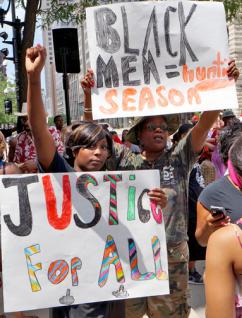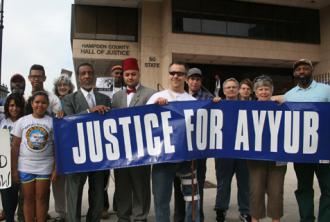The
determined message of Martin Luther King's famous speech will be as
important as ever as people from across the country travel to Washington
to protest racism.
 Protesting Trayvon Martin's murder and the targeting of young Black men
Protesting Trayvon Martin's murder and the targeting of young Black men
FOUR-AND-a-half years ago, an enormous crowd packed into the Capitol
mall in Washington, D.C., to celebrate the inauguration of Barack Obama.
The first African American president took the oath of office in front
of a Capitol building built by slaves.
Among the crowd on that January day, there was a sense of bearing
witness to progress--not only because of the historical significance of
the first Black president in a country founded on slavery, but also the
seeming sea change in contemporary politics after eight long years of
George W. Bush and the Republicans in power.
This weekend, another crowd--smaller, but likewise dominated by
African Americans--will gather on another part of the mall. They will be
commemorating a different historical moment: the 50th anniversary of
the 1963 March on Washington for Jobs and Freedom, where Martin Luther
King Jr. gave his "I Have a Dream" speech.
But they will also be protesting--expressing their anger at the
continuing grip of racism in so many forms, even as an African American
sits in the Oval Office.
By virtually every measure, the conditions and quality of life for
the majority of African Americas have declined during the Obama years.
More than other parts of the population, Black America has borne the
brunt of the economic and social crisis of the Great Recession years.
The March on Washington is an opportunity to focus a spotlight on this
reality, while the cameras of the media are rolling--and on the need to
do something about it with, as King said 50 years ago, "the fierce
urgency of now."
Not only is racism still with us--despite the claims that we are,
since Obama's election, living in a "post-racial society"--but the first
African American president has done nothing about the crisis of Black
America. On the contrary, for the last five years, Obama and his
administration have explicitly avoided being identified with "racial
issues."
This posture changed somewhat over the summer. Last month, Obama made
one of the only public statements of his presidency about racial
profiling and racism in the U.S. justice system--but only because of the
wave of outrage after the acquittal of George Zimmerman, the murderer
of Trayvon Martin. Likewise, Attorney General Eric Holder promised
changes in the Justice Department's policies on drug prosecutions and
mandatory minimum sentencing--after years of upholding the federal
injustice system.
Obama and his administration will get credit they don't deserve for
these statements and promises--among liberal leaders of mainstream civil
rights organizations and unions who will speak at the March, and also
among the crowd in general. Those committed to building the antiracist
struggle should take the opportunity this weekend to talk about the real
record--and about why liberal leaders who apologize for that record,
rather than challenge it, are making the situation worse.
Still, even if Obama and Holder are taken completely at their word,
it won't be news to anyone at the March that much, much more needs to be
done--and that the initiative for doing it is going to have to come
from outside the Washington political system, as it did after the
Zimmerman verdict.
That's a sentiment to build on--with the aim of using this national
mobilization against racism to advance local struggles around a wide
range of questions that marchers will return to on August 25.
- - - - - - - - - - - - - - - -
THE AUGUST 24 demonstration would have been an important historical
commemoration no matter what, but it took on a new dynamic after the
Zimmerman verdict.
The acquittal of a self-declared neighborhood watch captain who
stalked and killed an unarmed Black teenager dramatized how much the
issues of 50 years ago are with us today. A young Black man walking
after dark where someone decided he shouldn't be, his murderer declared
not guilty by a jury without a single African American--all that would
be very familiar to the marchers of 1963.
The issues of racial profiling and vigilante justice, carried out by
killers in uniform and out, naturally became one important hub for the
mobilization to Washington.
In New York City, participants in the struggle to win justice for the
victims of police murder like Ramarley Graham and Shantel Davis filled
up one bus by themselves and are looking for any way to get more people
to D.C. Among the thousands of others from New York will be those who
marched down Fifth Avenue last year in a silent protest against
"stop-and-frisk," the NYPD policy that a federal judge this month found
had violated the constitutional rights of hundreds of thousands of Black
and Brown New Yorkers.
There are other issues driving the turnout--as numerous as the many
faces of racism in U.S. society. In Chicago, the Chicago Teachers Union
is among the organizations behind the Chicago Labor Freedom Riders
caravan to D.C. Its participants want to emphasize how the assault
against public education and public-sector workers is bound together
with the attack on Black America.
So whether they've been to Washington protests before or are
attending their first national demonstration, many of those at the March
will be no strangers to struggle. For them, the bus rides to and from
D.C. and the rally and march itself will be a chance to build up
networks of solidarity--to make connections to people involved in the
same struggles in other cities, or their neighbors organizing around
different issues in their own hometown.
Thus, Joseph "Jazz" Hayden of the Campaign to End the New Jim Crow in
New York City is hoping the March on Washington will help activists
sink deeper grassroots far beyond the capital. As he told
SocialistWorker.org:
We saw the grassroots response to the Trayvon Martin decision, which led
to demonstrations in over 100 cities across the country. Imagine if we
were organized in 100 cities across the country. Anytime we decided we
wanted to put something on the national agenda, we could put it out
there instantly.
In addition, every person who brings their experiences to Washington
and every struggle represented at the March will add to the ideological
alternative to the conventional wisdom that has dominated mainstream
U.S. politics--that the problems of the Black community are largely, if
not entirely, the fault of the Black community itself.
That scapegoating message has been constant since the end of the
civil rights era in the mid-1960s, when openly preaching the inferiority
of African Americans fell out of favor in mainstream politics. Instead,
racism was repackaged, often through coded appeals for "law and order"
and "personal responsibility." Today, the idea that Blacks--and not the
system--are to blame for their own oppression is accepted across the
political spectrum, including, in varying degrees, by leading figures in
the Black community.
But as Keeanga-Yamahtta Taylor wrote for SocialistWorker.org:
[E]very once in a while, something happens that tears the mask off,
revealing the ugly face of U.S. society. The murder of Trayvon Martin
and now the acquittal of his murderer confirms again that racism is so
tightly packed into the blood and marrow of American democracy that it
cannot live without it.
The assembled masses of the marchers in Washington will be definitive
evidence, for anyone who cares to listen, of both the depth of the
crisis of Black America and the fact that its causes lie in systemic
oppression that is woven into the fabric of U.S. society and Washington
politics.
- - - - - - - - - - - - - - - -
NO OPPONENT of racism doubts that the Republicans and their
right-wing base are committed to bigotry and discrimination. They all
but say so themselves.
Case in point: The Supreme Court decision in June, by a 5-4 majority
along ideological lines, that gutted one of the main accomplishments of
the civil rights movement: the Voting Rights Act of 1965.
Gallingly, the conservative justices claimed that racist obstacles to
voting rights were a thing of the past, and therefore the act's major
protections could be done away with. That's a blatant lie--six of the
nine states that were specially scrutinized under the Voting Rights Act
passed new voting restrictions since 2010. All told, 19 states passed
more than 24 measures in 2011 and 2012 that make it harder to
vote--practically speaking, harder for
people of color to vote--and there's worse to come following the Supreme Court ruling.
The ugly logic is clear for Republicans--fewer Black and Brown voters
means fewer votes against them. Thus, the call for Congress to update
or amend the Voting Rights Act will ring out from the stage at the March
on Washington, and rightly so.
But many speakers will be hesitant to talk about issues where the
Democrats have a hand in implementing racist laws and policies. Take the
issue where Attorney General Holder recently spoke out: the "war on
drugs" laws that have been a leading cause of the incarceration boom in
the U.S.
Earlier this month, Holder told the American Bar Association that he
would urge federal prosecutors to avoid charging defendants in
nonviolent drug cases with offenses that carry mandatory minimum
sentences--one of the main contributing factors in the 800 percent
increase in the federal prison population since 1980. But there are
holes in Holder's announcement--not least that it will be up to
prosecutors whether to exercise the discretion Holder is allowing them.
Plus, Holder's new promises come after four-and-a-half years when the administration has
enforced some of the most unjust and racist policies of the decades-old drug war.
In June, for example, Holder's Justice Department argued in court for
enforcing existing sentences for prisoners under the notorious 100-to-1
rule--a sentencing guideline where mandatory minimums were triggered
for possession of a hundredth of the amount of crack cocaine (where
users are more likely to be Black) compared to powder cocaine (more
likely to be white).
In 2010, Obama signed the Fair Sentencing Act, which dropped the
disparity to 18-to-1--still a half measure that Jasmine Tyler of the
Drug Policy Alliance described as a license "to be a little racist."
But when a federal appeals court ruled that the new "fair" sentencing
should be applied retroactively for drug possession convictions,
Holder's lawyers went to court to oppose the decision--in effect, asking
that thousands of people, most of them poor and people of color, remain
behind bars under a sentencing guideline the administration itself
repudiated.
That Holder this month proposed reforms around mandatory minimums "is
a reflection of a change in public opinion and a rising tide of
activism among prisoners here in California and their families," Isaac
Ontiveros, an organizer with the prison abolition group Critical
Resistance, told the Common Dreams website. But the struggle against the
New Jim Crow can't end there, any more than civil rights activists of
the 1950s and '60s would have been satisfied with their first partial
victories against old-style Jim Crow segregation.
This weekend, people will come to Washington, D.C., from across the
U.S. to show their opposition to racism and send the message that action
is needed. The words of Martin Luther King's famous speech will be as
important as ever:
We have...come to this hallowed spot to remind America of the fierce
urgency of now. This is no time to engage in the luxury of cooling off
or to take the tranquilizing drug of gradualism...The whirlwinds of
revolt will continue to shake the foundations of our nation until the
bright day of justice emerges.
http://socialistworker.org/2013/08/22/the-fierce-urgency-of-now

























